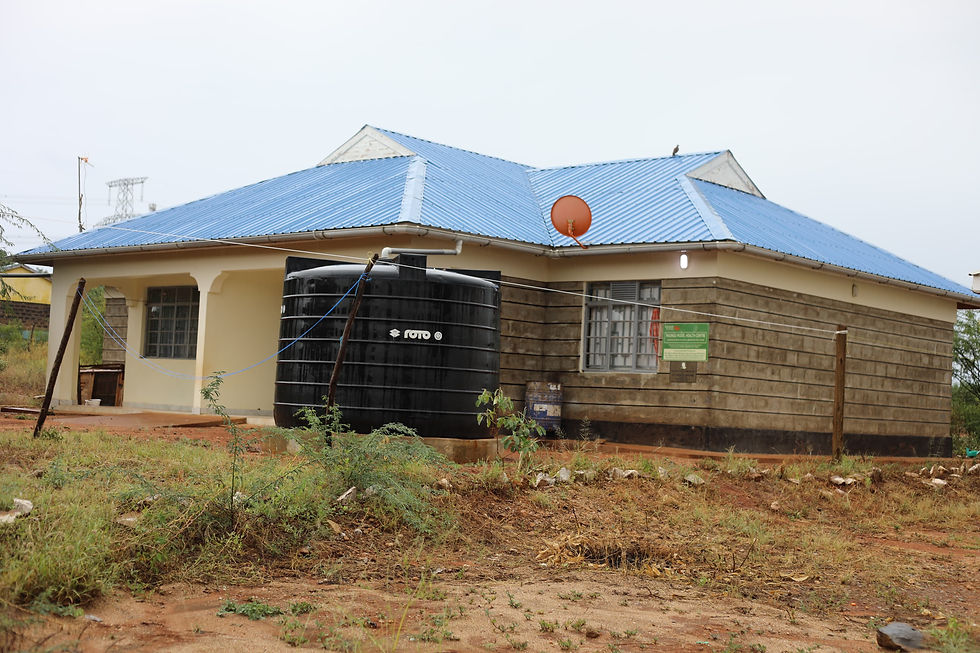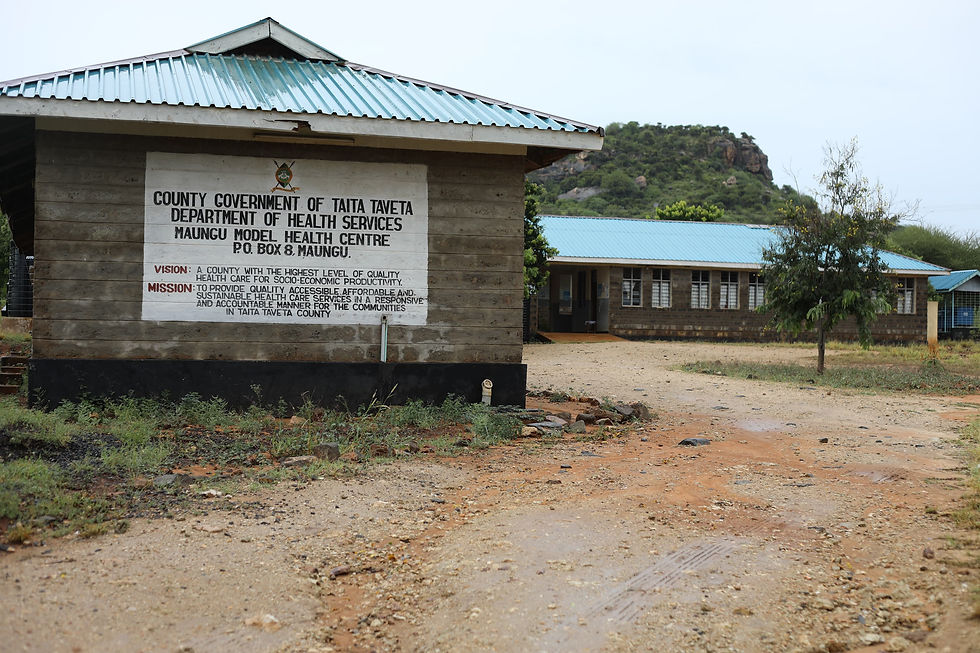Improving Healthcare Access in the Kasigau Corridor REDD+ Project
- Wildlife Works
- Jul 15, 2025
- 4 min read
Updated: Jul 21, 2025
Written by Noah Tingide, Media and Communications Assistant
“For someone who does not know, they might think that these are just ordinary houses, but for us, we see them as an opportunity to save lives”

In the Kasigau Corridor REDD+ Project area, accessing healthcare is a continually pressing challenge for local communities. Inadequate infrastructure, a lack of enough medical personell and limited medical facilities mean that many residents must travel long distances to receive care.
Maungu Model health centre , situated in Marungu, part of the project area, is one example. The next closest medical facility is in Voi, approximately 30km away. The centre has been operational for more than 20 years, serving approximately 8000 patients annually, with some traveling from areas as far as 20km away.
Despite the enormous amount of work put into the facility, retaining qualified healthcare professionals at the health centre is an ongoing struggle due to a lack of staff housing. Clinical Officer and Orthopaedics Specialist at Maungu Model Kalume Mbitha knows this issue well, as he would often find himself torn between duty and danger. On more than one occasion, his phone would ring late into the night with pleas for urgent medical help from community members in Marungu.
“My passion as a clinical officer is to see the community in a healthy state. I don’t want to see anybody die,” he says. But each time, he was forced to ignore the calls as venturing out meant risking encounters with wildlife or facing other security threats.
Mr. Kalume Mbitha works at the health centre and has over 15 years of experience in healthcare. He explains how life was at the facility before the intervention of the Kasigau Corridor REDD+ Project (KCRP).
“Before the Kasigau Corridor REDD+ Project intervened by constructing for us a twin two-bedroom house, we only had one old single structure, which was also renovated by the project, that could not accommodate all staff,” he says.

Marungu Model health centre has 17 staff members, with the majority opting to stay in Voi town, 30km away. “It would cost about Ksh 12,000 (about USD 100) per month to travel to and from work,” adds Mr. Kalume.
Through a community-led public participation, community members in Marungu expressed a need for staff housing for the health centre. The community-elected Locational Carbon Committee selected this project as a key priority because it was difficult to access health services when the medical staff had to commute for long distances, especially in emergency cases. This led to the construction of a twin two-bedroom staff house costing Ksh 7.75 million (about USD 60,000), with full amenities. Now, two staff members and their families can reside at the health centre.
“For someone who does not know, they might think that these are just ordinary houses, but for us, we see them as an opportunity to save lives,” he says.
According to Mr. Kalume, a report revealed a rise in fistula cases, maternal deaths, and infant mortality in Marungu location. “After conducting an investigation, we discovered that most women who give birth at night are attended to by untrained midwives because there are no doctors available at the facility,” he explained.
He further noted that many community members cannot afford transportation to Moi County Referral Hospital, with travel costs amounting to about Ksh 3,000 (approximately USD 23).
“When childbirth is not managed by a trained professional, it can lead to complications such as excessive bleeding, fistula, or, in the worst cases, death,” Kalume added.

He recalled a distressing incident in early February 2025, where a woman in the community gave birth at home under the care of an unqualified person. She suffered severe bleeding and nearly lost her life. Fortunately, she was rushed to the facility in the early hours of the morning, treated, and made a full recovery.
Since the construction of new staff housing at the facility, the situation has significantly improved. “Doctors are now present around the clock. The number of women delivering at the facility has doubled over the past year, and we have not recorded any new cases of birth-related complications from the community,” Mr . Kalume reported.
Furthermore, the Maungu Model Health Centre, situated along the busy Nairobi-Mombasa highway, a notorious accident-prone zone, plays a critical role in handling severe emergency cases, often at odd hours. The availability of professional medical staff not only serves for mothers and newborns but also for other emergency cases such as car accident victims requiring urgent care.
“Today, we are free to serve the community at any hour of the night. There are no more expenses for us, there are no risks, and the community is happy about our presence here, thanks to the houses built by the Kasigau Corridor REDD+ Project,” concluded Kalume.
Kalume appreciated the efforts made by the project in serving the community, highlighting that its positive marks are undeniable, and lives have been touched. He expressed his eagerness for more projects at the facility from the project.
Through the sale of carbon credits, the Kasigau Corridor REDD+ Project has invested in health, social and economic development for more than 100,000 community members. Communities in the Kasigau Corridor REDD+ Project earn revenue share from protecting their forests, which they then collectively decide to spend on projects through public participation, where the most-voted-for project wins. The Kasigau Corridor REDD+ Project is a globally recognized forest conservation initiative supported by the landowners of 14 ranches. Their partnership has been pivotal in driving both environmental protection and socioeconomic transformation in the region.
The Kasigau Corridor REDD+ Project thanks Clinical Officer Kalume and his colleagues for their service to the community and their work to save lives at Maungu Model health centre.



